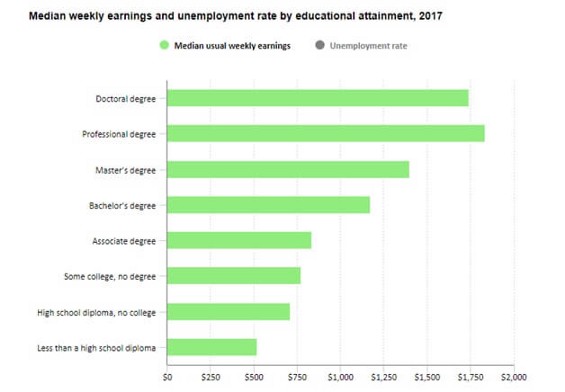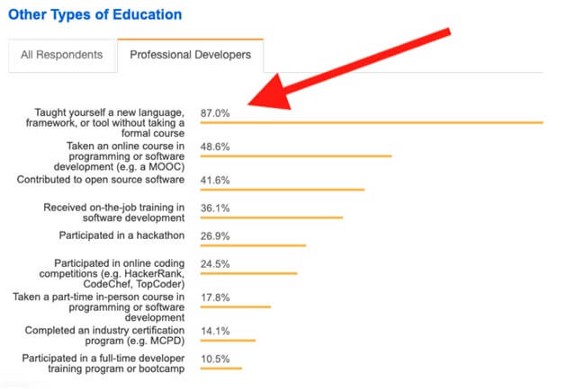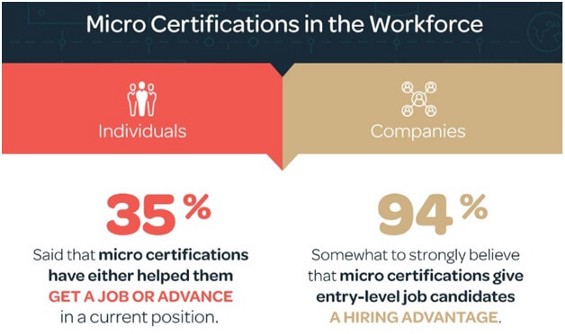Are you preparing to enter the IT job market for the first time? Well, now is a great time to begin a career as an IT professional!
It’s been estimated that more than five million jobs in IT will be added globally by 2027. The demand for tech roles has been booming over the past few decades, and there are no signs it’s slowing down. In fact, tech job roles like software developers are predicted to increase by 30% in the next decade.
If you don’t really know where to begin, we’ve put together this guide that offers you in-depth instructions for landing that first position in IT.
Pursue a bachelor’s degree
Today, in this highly competitive market, a degree is a necessity. Can you make it without it? Yes, you can! Will it be more challenging? Yes, it will!
In fact, it’s been found that having a degree halves your chances of being unemployed. Moreover, having a diploma can lead to higher pay. In the US, for example, a person who holds a bachelor’s degree earns $461 more each week than a person who doesn’t hold a university diploma.
Meaning, if you have the time and money to invest in obtaining a degree in IT, it certainly can be a great way to start your tech career. If you want to save money, consider taking your first two years at a local community college and then transferring to a university. In short, education can equip you with a solid technical background. It looks good on your resume, and it looks great in the eye of an IT recruitment agency. However, it’s also true that what most universities will teach you is theory. You’ll gain most of the applicable know-how through self-learning or on-the-job experience.


Enter a Bootcamp program
IT recruitment agencies and companies have such a high need for tech talent that many of them are happy to hire employees who obtained their skills at a Bootcamp.
Bootcamps are technical training programs that usually last for about 12 to 24 weeks. Instead of going through four years of college, these programs offer accelerated learning. During these programs, you’ll learn the core basics of programming and get real-life work experience.
If you don’t have the time to enroll in a Bootcamp program, there are many Bootcamp courses online that can equip you with the right set of skills.
A Bootcamp program can help you:
- Improve your technical skills and boost your confidence.
- Learn from experienced professionals.
- Grow as a professional by being part of a vibrant and supportive community of tech enthusiasts.
- Gain access to mentoring, networking, peer programming, and learning materials.
All in all, if you want to start a career in IT, are motivated to learn and grow on your own, and can dedicate at least 20 hours per week, then a Bootcamp program might be the best pick for you.
Try self-learning
Educating yourself and building a portfolio without a degree is entirely possible. There are thousands of developers who got a tech job without a formal IT degree. According to the StackOver Flow 2018 Survey, 87% of respondents said they taught themselves a new programming-language / technology.
Even if you hold a degree or have attended tech Bootcamp, self-learning can broaden your skills and knowledge.
Low-cost coding lessons on sites like Treehouse, Pluralsight, Udacity, and Launch School are a good option. You can also find documentation for all of the open-source tools, languages, and frameworks online. There’s an online tutorial for any technology that you want to learn. What you need to do is pick a tech stack and run a Google search.
Also, take advantage of resources such as StackOverflow and GitHub to keep your skills up-to-date. Make your code visible to show off your skills. Code samples or postings on a site like Github.com matter a lot to recruitment agencies and employers.


Earn certifications
If you’re looking to pave your way into the tech sector, getting certified is a surefire way to achieve this. Your best bet for getting hired is to validate your skills and knowledge through a number of carefully chosen certifications.
Employers and job placement agencies alike hold IT certifications in high regard as they can bring many benefits. Some of the benefits include improved productivity, faster troubleshooting, and fewer skills gap in the workforce. Being certified can undoubtedly give you a competitive advantage when hiring managers look at your resume.
You even earn some technical skills in the form of micro-certifications that confirm you have a certain skill. A recent Linux Academy survey of 6,000 IT professionals found that 94% of employers believe micro-certifications give entry-level candidates an advantage. The best part about these micro certifications is that you will gain skill sets in a particular technical area and receive a credential in a matter of days.

Gain relevant work experience
Employers and IT recruitment agencies want to see you have skills that line up with your desired position.
One way of gaining experience is by working on smaller freelance projects. Get in touch with friends, family, and former colleagues to refer you to potential clients. Join meetup groups, seminars, or conferences where you might find clients.
Another good idea is to find an internship. It doesn’t matter if it’s paid, unpaid, summer, or winter. You’ll gain valuable work experience and discover opportunities for employment. In fact, many internships turn into a full-time job.
There are thousands of websites that you can use to find internships. Make sure you check Indeed, Glassdoor, Idealist, and Chegg Internships. Or, you can always look for opportunities on a job site like Linkedin.
Similar to interning, volunteering can also help you broaden your IT work experience. Consider helping small businesses to create a new app, software, or program for free. Small businesses generally are open to receiving help from volunteers.

Summing Up
Landing your first job in IT has several different approaches. You can enroll in college, or you can enter a Bootcamp program. You can learn through online courses and intern at a tech company at the same time. Don’t get discouraged and keep on investing in your skills and knowledge. Once recruiters see your extensive resume, they’ll be wise enough to get you hired.









